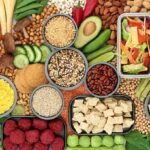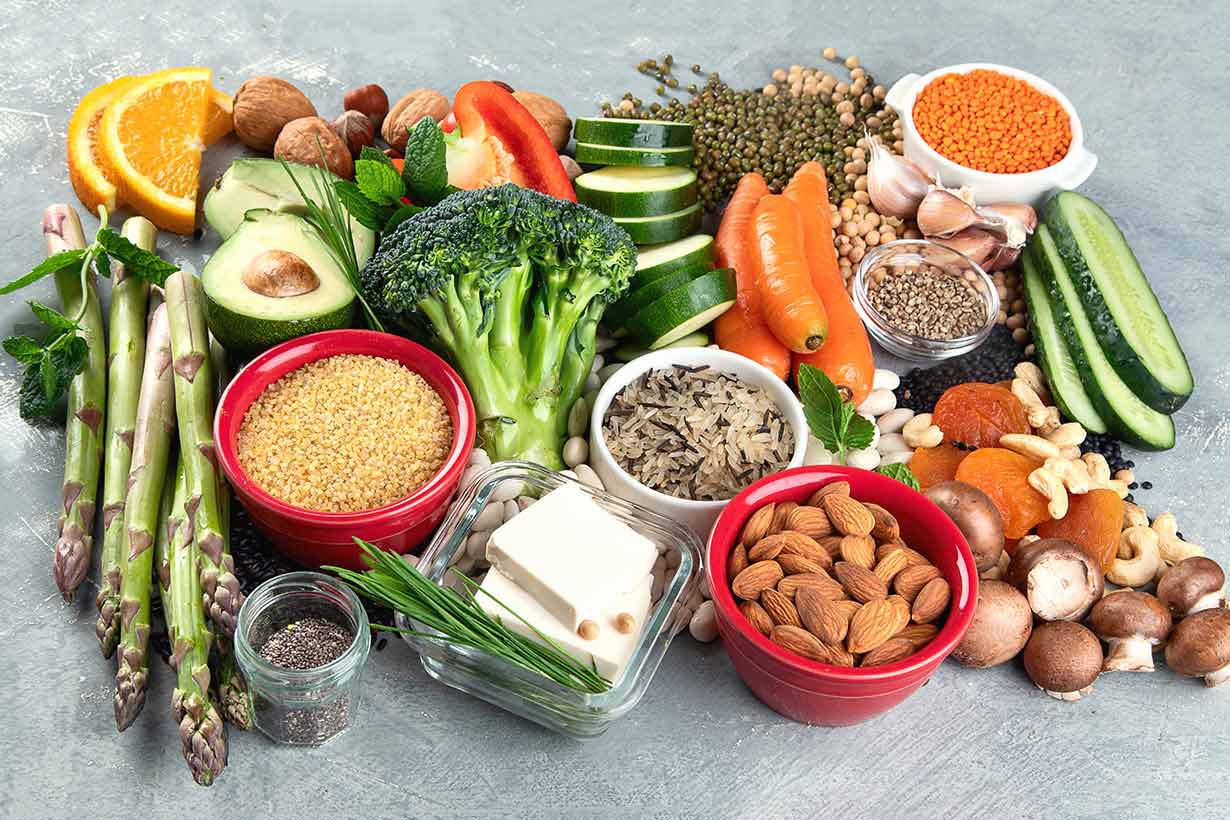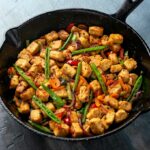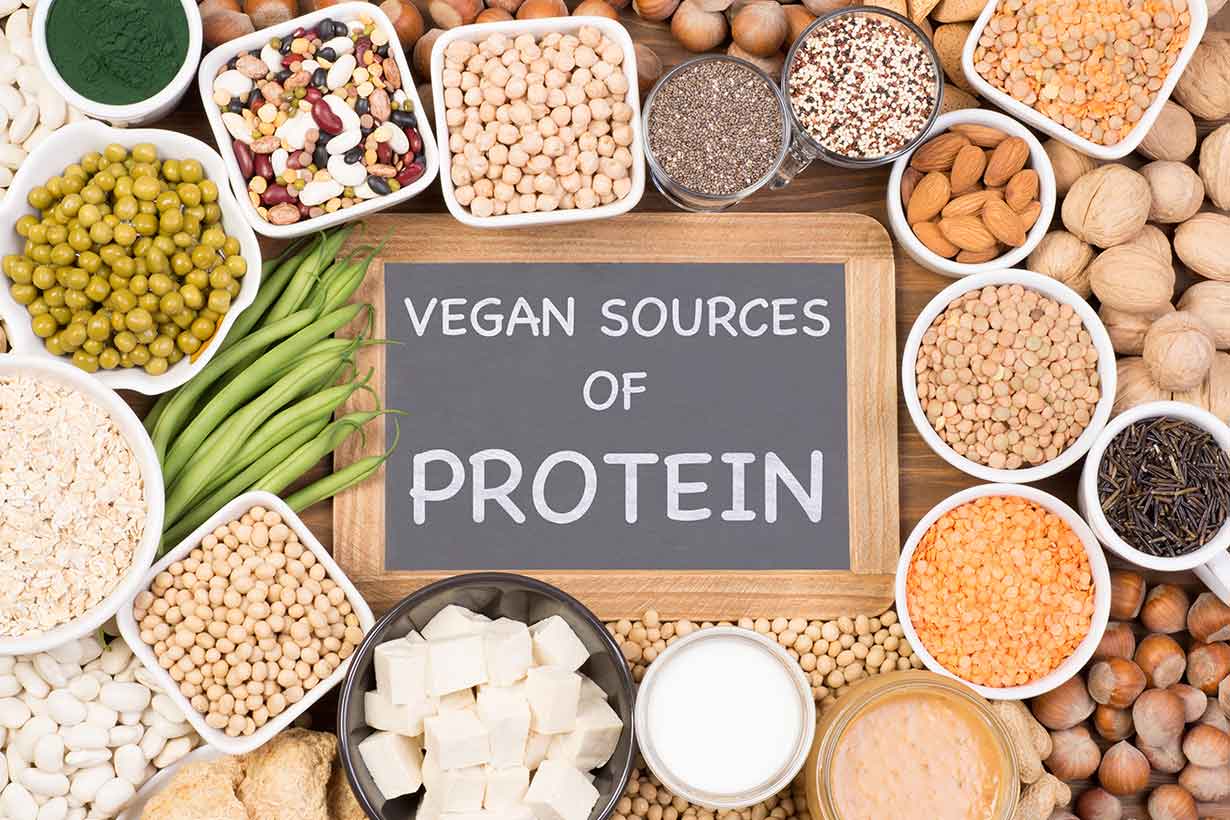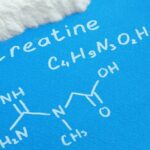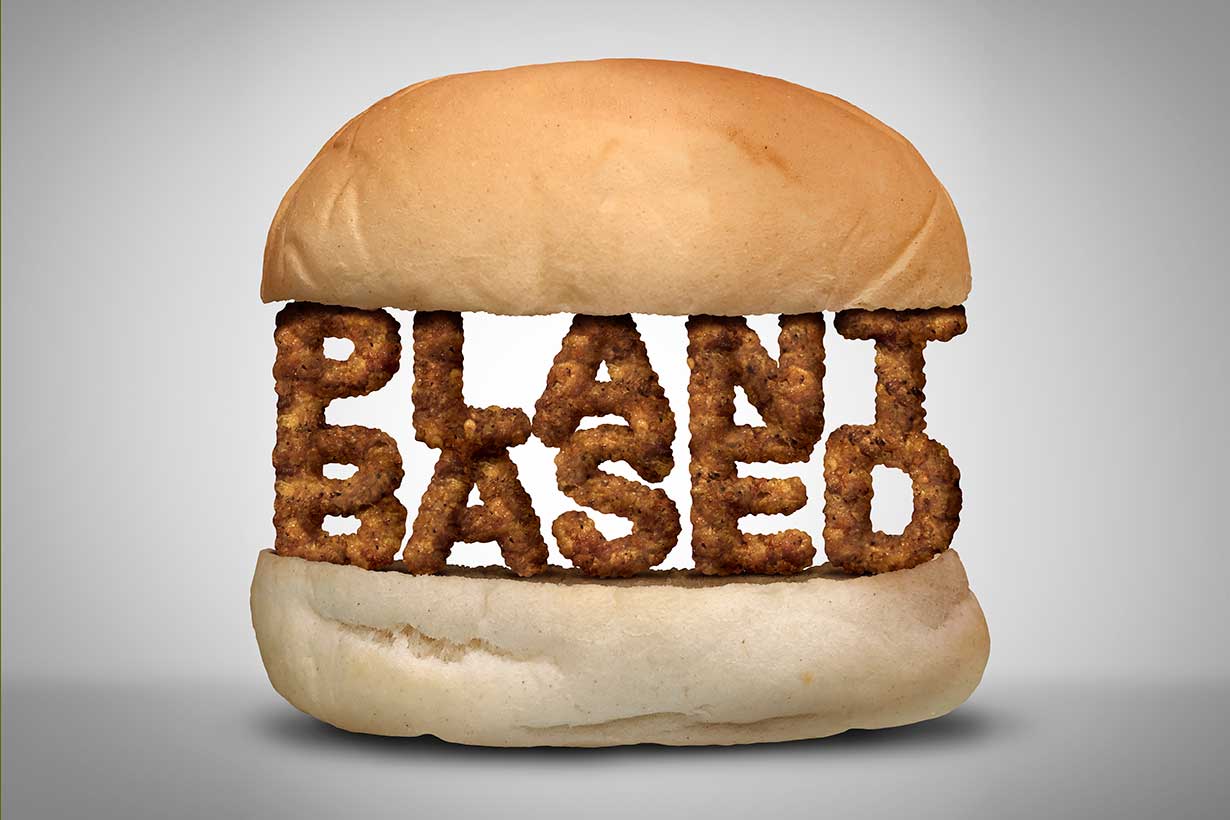It is clear that well-formulated vegan plant-based diets can be a healthy choice of diet.
However, there are potential nutrients of concern for people following the diet, and it is important to be aware of these.
Firstly, animal-based foods contain some unique nutrients not found elsewhere. We must consider what happens when we remove these foods from the diet and whether we need to replace them.
In this article, we examine some specific nutrients that vegan diets don’t provide, whether these nutrients are essential, and how we can obtain them on a vegan diet.
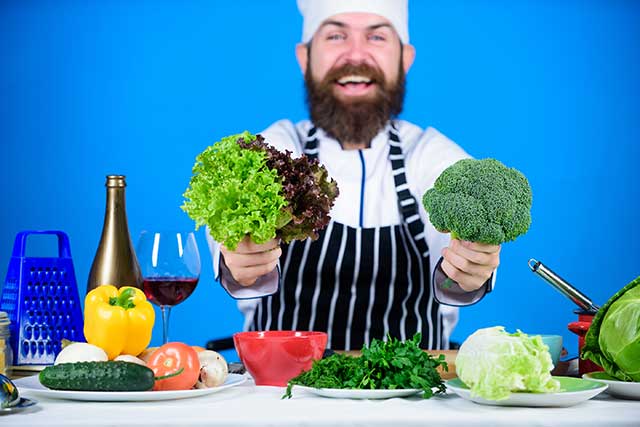
Table of contents
1) Vitamin B12
Vitamin B12, otherwise known as cobalamin, is an essential water-soluble vitamin with a wide range of important functions.
Among these functions, vitamin B12 is vital for forming and maintaining healthy red blood cells and energy metabolism (1).
Furthermore, a chronic vitamin B12 deficiency may potentially lead to adverse health conditions including but not limited to (2, 3, 4);
- Depression
- Megaloblastic anemia
- Nerve problems
- Stomach inflammation
- Neural tube defects (NTD) during pregnancy
- Weakness
We can only naturally find this vitamin in animal foods such as meat, eggs, fish, and other seafood.
Is Vitamin B12 Essential?
Yes, vitamin B12 is essential for human health, and it is vital to ensure an adequate intake when following a vegan diet.
However, research shows that the average depletion and deficiency rates for vitamin B12 among vegetarian dieters are (5);
- Children: 25-86%
- Adolescents: 21-41%
- Pregnant women: 62%
- Elderly: 11-90%
The research also shows that these deficiency rates are higher in vegans.
Can Vegan Diets Provide Vitamin B12?
Vegans may get vitamin B12 from two sources:
- Fortified foods (e.g., breakfast cereals, nutritional yeast, and certain vegan products)
- Supplements
Out of these two choices, a supplement is the safer (more guaranteed) source if not meticulously tracking food/nutrient intake.
Note: This is not an “optimal” choice – it is an essential one. If following a vegan diet, it is important to ensure a sufficient intake of vitamin B12.
The amount you need each day, stratified by sex and age, can be found here.
2) Retinol: Pre-formed Vitamin A
Vitamin A is an essential fat-soluble vitamin that is available in two forms – retinol and provitamin A carotenoids. This important nutrient plays a key role in immune health and red blood cell production (6).
Retinol, found in animal foods, is pre-formed vitamin A in its active state. Without going into extensive detail, this simply means that the body can use it in its current form without relying on any conversion.
When we consume carotenoids, the body needs to convert them to retinol in the intestines, but the conversation rates can be quite poor (7).
In other words: retinol is a more effective source of vitamin A gram-for-gram.
The Difference In Vitamin A Bioavailability
To make the difference more clear between retinol and beta-carotene, the Food and Nutrition Board at the Institute of Medicine of the National Academies created a new way to measure vitamin A in food called ‘retinol activity equivalents’ (RAE) (8).
This measurement helps individuals to better understand the relative bioavailability of vitamin A from different sources.
According to the measurement system, the difference between the carotenoid beta-carotene and retinol is (8);
- 1 IU of retinol = 0.3 mcg RAE vitamin A
- 1 IU of beta-carotene from food = 0.05 mcg RAE vitamin A
According to the retinol activity equivalents system, retinol is approximately 6x more bioavailable than beta-carotene as a source of vitamin A.
However, this is not a significant issue for vegans who consume carotenoid-rich plant foods.
The reason for this is because foods like carrots and sweet potatoes contain such substantial amounts of carotenoids that the difference in bioavailability is less of a concern.
Is Vitamin A (As Retinol) Essential?
Vitamin A is an essential nutrient, but we can get it from retinol or carotenoids.
Pre-formed retinol is not essential.
Can Vegan Diets Provide Vitamin A?
Yes.
The recommended daily value for vitamin A is 900 mcg RAE (retinol activity equivalents).
Here are some vegan foods that provide significant amounts of retinol activity equivalents:
- One regular carrot: 501 mcg RAE (9)
- A 130-gram sweet potato: 922mcg RAE (10)
- 100 grams of kale: 241 mcg RAE (11)
- 100 grams of spinach: 469 mcg RAE (12)
Thus, if an individual following a vegan diet eats enough carotenoid-rich plant foods, vitamin A should not be a nutrient of concern.
Tip: consuming carotenoids alongside a source of fat increases the absorption rate.
3) Vitamin D3
Vitamin D is more than just a vitamin, and it is a hormone that plays a significant role in the immune system (13).
This vitamin also regulates the amount of calcium in our blood, thereby having an important influence on bone health (14).
Is Vitamin D Essential?
Vitamin D is an essential vitamin that we need to obtain in sufficient quantities.
On this note, low blood levels of vitamin D may potentially increase the risk of depression, bone loss, and a variety of chronic diseases (15).
Can Vegan Diets Provide Vitamin D3?
Vitamin D3 is only available from animal foods such as eggs, oily fish, and organ meats (16).
However, it is possible to get vitamin D on vegan diets from foods such as UV-exposed mushrooms (vitamin D2) and fortified foods.
Also, while obtaining sufficient vitamin D is an issue, it isn’t a vegan-exclusive issue. For instance, insufficient vitamin D levels can be quite prevalent in countries with long, dark winters, regardless of diet preference.
For vegans (and omnivores) who live in cold and dark places over winter, it may be worth considering a vitamin D supplement.
4) Creatine
Among its various roles, creatine provides energy for muscular contraction. It is a compound that we can only find in animal foods such as red meat, poultry, and fish (17).
Since vegan diets restrict the consumption of all animal foods, they cannot provide dietary creatine.
However, the human body can synthesize and produce its own creatine through the amino acids glycine, arginine, and methionine. As a result, we do not need to obtain it from dietary sources (18).
That said, research shows that dietary creatine intake offers some unique benefits. For instance, a higher dietary intake of creatine can improve sports performance (19).
Research also shows that vegan (and vegetarian) diets promote lower muscle creatine stores (20).
For this reason, vegan dieters who are serious about sports performance may wish to consider creatine supplementation as well as ensuring sufficient protein intake.
However, it is not a necessary consideration for general health.
For more on the topic of creatine’s role in vegetarian and vegan diets, refer to the following guide:
Should Vegetarians and Vegans Take Creatine?
5) Heme Iron
Iron is an essential mineral involved in forming hemoglobin and oxygen transportation (21).
There are two different forms of dietary iron, and these are;
- Heme iron: highly bioavailable, and found in animal foods
- Non-heme iron: found in plant foods, and it has slightly lower bioavailability
Researchers estimate the bioavailability of iron from omnivore diets is around 14-18%. However, for vegetarian diets, this falls to 5-12% (22).
For this reason, the reference daily intake (RDI) for iron in vegans is 1.8x higher than for people consuming a diet including animal foods (23).
Is Heme Iron Essential?
No, heme iron is not essential, and we can get iron from non-heme plant-based sources.
Can Vegan Diets Provide Heme Iron?
No, vegan diets contain no heme iron.
However, it is possible to maintain regular iron stores providing the diet contains enough non-heme iron.
Some of the richest food sources of non-heme iron include:
- Cocoa/dark chocolate
- Leafy greens such as spinach
- Lentils
- Soy-based foods such as natto and tempeh
6) Taurine
Taurine is an important amino acid found in the human body.
We do not require taurine from the diet because the human body can produce it naturally from the amino acids cysteine and methionine (24).
However, despite dietary intake not being essential, there may be benefits from it. On this note, randomized controlled trials show that taurine supplementation can reduce blood pressure and lower markers of cardiovascular risk (25).
Since taurine does not occur in plants, vegan diets do not provide it. Further, vegans appear to have lower blood levels of taurine than omnivores do (26).
Is Taurine Essential?
Taurine is not essential, and we do not require it from our diet.
However, a higher dietary intake may potentially have benefits.
Can Vegan Diets Provide Taurine?
No, vegan diets do not provide taurine, which is only available from animal foods.
It is not an essential dietary nutrient, but future research may help to ascertain whether it is an ‘optimal’ one.
The average taurine intake on an omnivore diet is thought to lay between 40 mg and 400 mg per day (27).
For this reason, it is a compound that may be worthy of supplementing.
7) Carnosine
Carnosine is a dipeptide molecule formed by two amino acids: alanine and histidine (28).
Once again, our body can produce this compound, so it is not essential that we get it from our diet.
However, there is evidence that consuming it from our diet may have benefits. For instance, a recent systematic review on carnosine suggested that the compound has anti-glycating properties. In other words, it may help to reduce the formation of AGES (advanced glycation end products) in the body (29).
That said, most of the included studies in this systematic review were cell and animal-based studies, and more studies in humans are necessary to better investigate this.
A meta-analysis of randomized controlled trials recently demonstrated that diets low in AGES may reduce markers of cardiovascular health by improving insulin resistance, blood lipids (cholesterol), inflammation, and oxidative stress (30).
Is Carnosine Essential?
No, it is not essential that we consume pre-formed carnosine as part of our diet.
However, doing so may potentially have benefits.
Can Vegan Diets Provide Carnosine?
Vegan diets do not provide carnosine, which is only found in animal foods.
There is not a substantial amount of research available on this compound, but research shows vegetarians have a 26% lower blood concentration of carnosine than omnivores do (31).
Again, carnosine supplementation could change this, but it isn’t thought to be an “essential” supplement for vegan diets.
8) DHA/EPA Omega-3
Docosahexaenoic acid (DHA) and eicosapentaenoic acid (EPA) are the active and most bioavailable forms of omega-3. These fatty acids are mainly found within seafood, particularly oily fish like salmon, sardines, and tuna (32).
The bioavailability of DHA and EPA is significantly higher than from alpha-linoleic acid (ALA), another form of omega-3 that we can find in plant-based foods such as seeds, nuts, and vegetables (32).
Recent research has demonstrated that DHA and EPA appear to have clear beneficial effects:
- A 2021 meta-analysis of intervention trials found that EPA and DHA supplementation can help to prevent particular cardiovascular events, in an apparent dose-dependent manner. Among the results, EPA and DHA supplementation reduced the risk of fatal heart attacks by 35% (33).
- Based on a 2018 meta-analysis of prospective cohort (observational) studies, fish intake of 100g per week reduced the risk of stroke by 2%. When fish intake was 700g per week, there was a 12% lower risk of stroke (34).
- A 2021 meta-analysis of 25 prospective cohort studies involving more than 2 million participants demonstrated that fish consumption was associated with a 9% reduced risk of cardiovascular disease mortality. Further, higher omega-3 intake from seafood was associated with a 13% lower risk of cardiovascular disease mortality (35).
- A further 2021 meta-analysis of observational studies and experimental trials found that there was an overall 10% reduced risk of all-cause dementia from up to two portions (250g) of fish per week. Furthermore, as levels of EPA and DHA in the blood rose, the executive functions of the participants improved (36).
Additionally, the intake of DHA and EPA has a clear effect on increasing the omega-3 index, which refers to the amount of DHA and EPA in the blood. However, ALA, as found in plants, does not raise the omega-3 index in the same way as DHA and EPA (37).
Based on the results from large observational studies, a higher omega-3 index is strongly associated with a reduced risk of coronary heart disease mortality (38).
Are DHA and EPA Essential?
It is not essential to consume DHA and EPA, but the scientific research on these fatty acids strongly suggests they are beneficial for human health.
Can Vegan Diets Provide DHA and EPA?
The intake of DHA and EPA on a vegan diet is possible from supplementation.
Algae is a natural source of DHA and EPA, and algae-based supplements are available that can supply these fatty acids in a vegan-friendly way.
A variety of these supplements can be found here (disclosure: affiliate link)
Final Thoughts
As always, nutrient-dense whole foods should be the main focus of healthy dietary patterns. This is the case whether the diet follows an omnivore, vegetarian, vegan, or any other dietary pattern.
However, as shown in this article, there are several nutrients and potentially beneficial compounds that vegan diets don’t provide.
For people who have decided to try a vegan diet, it is important to ensure sufficient intake of vitamin B12, which is an essential nutrient. The other nutrients mentioned may also be worth considering when planning the diet.
This guide to the best vegan-friendly source for all nutrients may help in this regard.
Lastly, it is also worth noting that plant-based meat products, such as the Awesome Burger, are not necessarily nutrient-matched meat substitutes, and this should be considered when making dietary changes.

